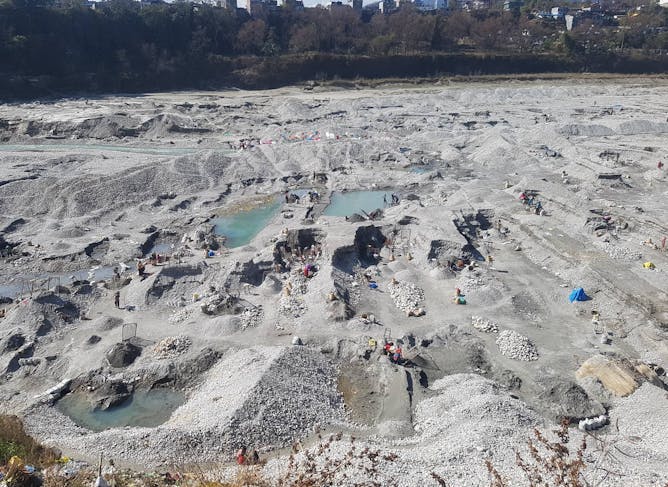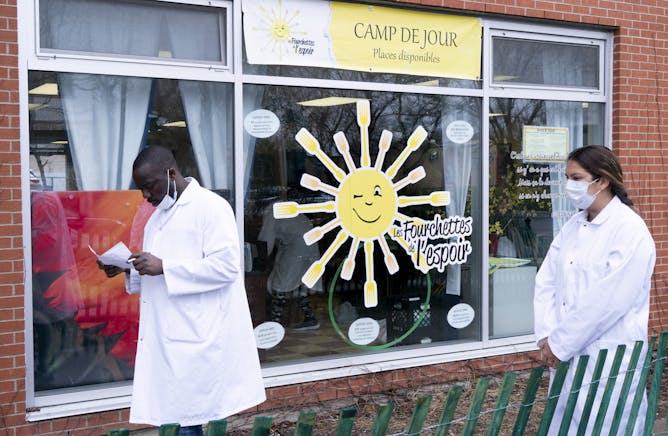|
Sand, a key ingredient in concrete, has helped fuel construction booms and land reclamation around the world. But careless and sometimes illicit sand extraction has destabilized bridges and roads, wrecked ecosystems and stolen riverbanks and coastlines. It has led to water shortages and salt-water intrusion into farmer fields, killing crops. Those who work in the sand-mining industry often find themselves in precarious, exploitive and dangerous jobs.
Today in The Conversation Canada, Melissa Marschke from the University of Ottawa and her colleagues write about the crisis fuelled by urbanization and our seemingly boundless appetite for sand.
Also today:
Regards,
|

A sand mine in Nepal. Growing urbanization and its need for concrete is fuelling a global sand crisis.
(Michael Hoffmann)
Melissa Marschke, L’Université d’Ottawa/University of Ottawa; Jean-François Rousseau, L’Université d’Ottawa/University of Ottawa; Laura Schoenberger, L’Université d’Ottawa/University of Ottawa; Michael Hoffmann, Martin Luther University Halle-Wittenberg
As sand markets boom, entrepreneurs, organized crime and others are cashing in — leaving widespread environmental damage in their wake.
|

Technology offers youth new tools – but what such tools can help young people achieve depends on what they already know and larger contexts.
(Shutterstock)
Diane R. Collier, Brock University; Mia Perry, University of Glasgow
Society needs to spend as much time considering youth options for creating as we we do considering what can happen with digital learning, finds a study in Hamilton, Canada and Glasgow, Scotland.
|

Babies around the world love ‘baby-talk’ and it can help them learn language too.
(Richard Sagredo/Unsplash)
Melanie Soderstrom, University of Manitoba; Michael C. Frank, Stanford University
New research shows that babies around the world love baby talk — and when adults baby talk to them it is good for their language development.
|

Now might be a good time to lean towards a plant-based diet — like this vegetarian burger pictured — both for our health and that of meat plant workers.
(Unsplash)
Andrea Freeman, University of Hawaii
Trump’s recent executive order to keep meat plants open is premised on a lie: that a meat shortage is a food shortage.
|

Keeping young Canadians working during the global panedemic is important for a host of reasons.
(Pixabay)
Louise Grogan, University of Guelph; Lucia Costanzo, University of Guelph
Now that Canadian youth can work part-time without becoming ineligible for government assistance, many will be incentivized to work in jobs in increased demand during the COVID-19 shutdown.
|

The coronavirus pandemic is affecting businesses differently and startups are especially vulnerable.
(Shutterstock)
Felix Arndt, University of Guelph; David Crick, L’Université d’Ottawa/University of Ottawa; Ricarda B. Bouncken, Bayreuth International Graduate School of African Studies
The coronavirus pandemic is an exceptionally challenging time for start-ups. Here's a guide to help new businesses survive.
|

Shutterstock
Joshua Gans, University of Toronto
The feedback form regular readers was better than the feedback from professional economicsts.
|

Des travailleurs dirigent des clients alignés dans un centre communautaire pour des dons de nourriture à Montréal-Nord, le quartier le plus touché du Québec par la Covid-19, le 30 avril. C'est aussi l'un des quartiers les plus pauvres au pays.
La Presse Canadienne/Paul Chiasson
Ryoa CHUNG, Université de Montréal
Les épidémies révèlent les inégalités tolérées en temps « normal » mais qui auront ont un impact délétère sur la santé d'une population si des mesures ne sont pas prises pour compenser ces injustices.
|
|
|
Science + Technology
|
-
Michael Lam, Rochester Institute of Technology
The term 'Big Bang' might make you think of a massive explosion. Put the thought out of your head. Rather than an explosion, it was the start of everything in the universe.
|
|